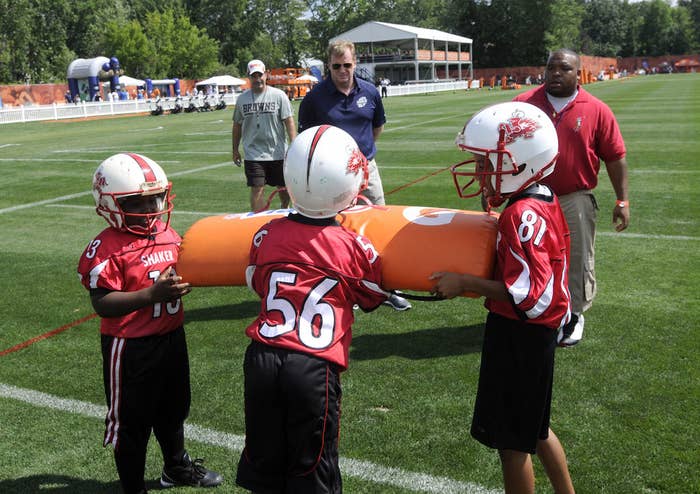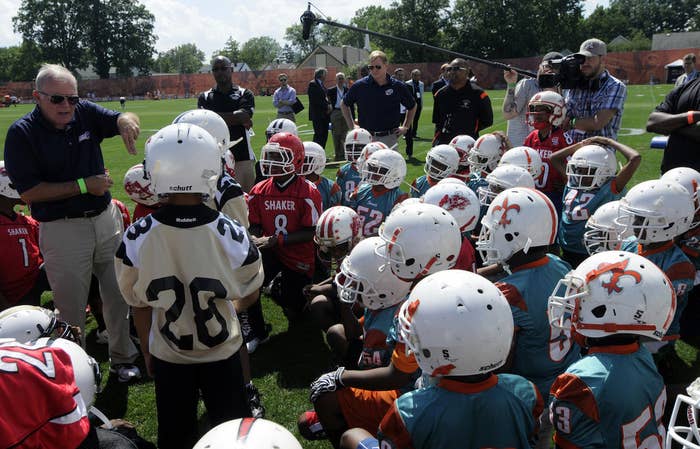
Pop Warner announced a ban on kickoffs for its three youngest play divisions on Thursday — one day before a House of Representatives Committee on Energy and Commerce hearing on concussions in youth sports in Washington.
The youth league said in a release "it will become the first national football organization to eliminate kickoffs. The ban, which begins this fall, "is aimed at significantly reducing the amount of full-speed, head-on impact in games."
Its three youngest divisions, Tiny Mite (5-to-7-years- old), Mitey Mite (7-9) and Junior Pee Wee (8-10), will instead begin a possession with the football on the 35 yard line. Pop Warner also said it will monitor the kickoff ban in its youngest divisions "as it considers implementation in older divisions."
The leagues will also reduce "contact time in practice across all divisions" from 33% of the time to 25% of the time.
"We are constantly working to make the game safer and better for our young athletes, and we think this move is an important step in that direction," Pop Warner Executive Director Jon Butler said. "We are excited to look at the results at the end of the year as we explore additional measures."
Friday's Congressional hearing will focus on the following issues:
* Effects on children and the disproportionate lack of attention on this large population
group;
* Policies or guidelines for practice and game situations;
* Educational and training policies for athletes, coaches, and parents;
* The current scientific and medical knowledge around concussions in youth athletes and its effect on policy or rules development;
* The role of culture in youth sports; and
* Research related to youth athletes.
Dr. Robert Stern, a professor of Neurology, Neurosurgery, and Anatomy and Neurobiology at Boston University School of Medicine led research teams in 2015 that published two studies about the influence of the age of first exposure to tackle football in cognitive and neurological development later in life.
In a study published in Neurology, former NFL players were surveyed on the age at which they first began playing tackle football. The research, which is far from definitive on the subject, found a "significant" difference between those who began playing tackle football prior to age 12, and those who began playing after age 12.
The second study, published in the Journal of Neurotrauma, examined the same set of former NFL players, this time looking at the differences in the structure of the brain.
"What those two studies together suggested was that there's now some evidence that being exposed to repetitive head impacts during a potential window of neurodevelopmental vulnerability may lead to later life difficulties in cognitive functioning as well as the integrity of important structures of the brain," Dr. Stern told BuzzFeed News Thursday.
"What I mean by window of neurodevelopmental vulnerability is that there's lots of research [showing] this period between ages 9 and 12 in normal development during which there is tremendous maturation of critical brain structures. It's just such a striking period of key maturational milestones that it may make sense that receiving hits to the head during that time may result in later life difficulties."
"It is so critically important for our kids to be involved in sports and athletics because of the tremendous physical and psychological and social benefits," Dr. Stern added. "Football can be a wonderful way of fostering all of those benefits. But football for kids that involves hitting their heads over and over again may not make the best sense."
"There isn't adequate science yet to have definitive statements about what's safe and what's not safe, but there's also just common sense," Dr. Stern said.

In recent years, Pop Warner has made deliberate changes in policies and coaching training to potentially increase player safety.
In 2010, Pop Warner implemented a concussion policy that requires immediate removal from the game and "written clearance" by a medical professional to return to "Pop Warner activities," along with forming an independent medical advisory committee.
Pop Warner also requires coaches to be trained in "safer approaches to tackling and blocking."
"In 2012, Pop Warner banned full-speed head-on, blocking or tackling drills in which the players line up more than three yards apart," the football organization said in its announcement of the new kickoff rules.
Pop Warner has settled two lawsuits in 2016 regarding former players.
In January, a lawsuit was settled with Donnovan Hill, a former Pop Warner player who was paralyzed in 2011 at age 13 when he dropped his head while going into a tackle and broke his neck. The lawsuit argued that Hill was taught to tackle with his head down, a dangerous tackling technique.
In February, Pop Warner settled with the family of Joseph Chernach, a former youth football player who played Pop Warner and in high school only, who killed himself at age 25. He was found to have CTE, the neurodegenerative disease associated with repetitive sub-concussive hits to the head.
